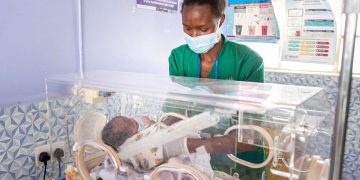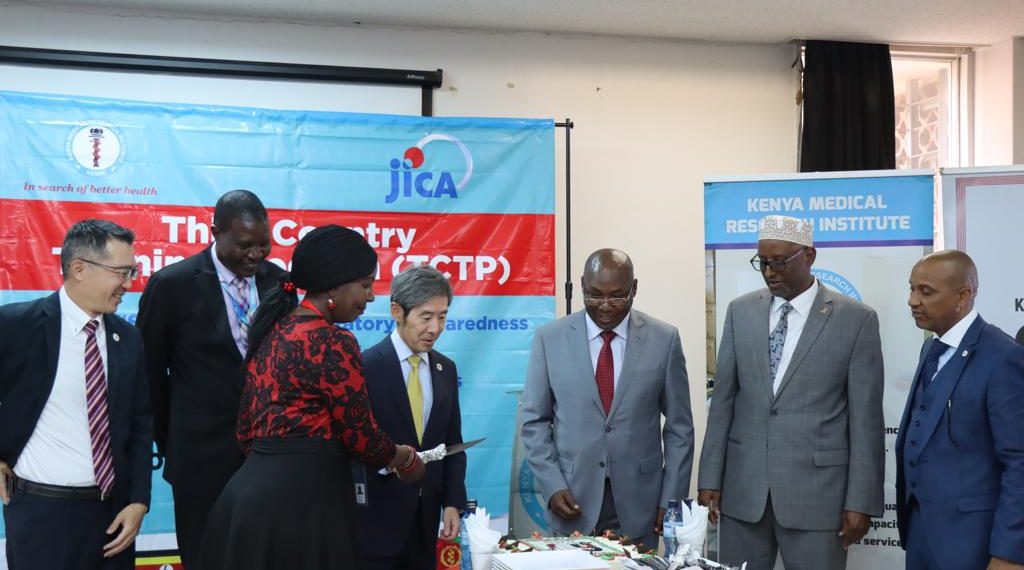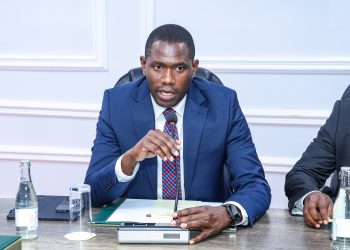Kenya Medical Research Institute (KEMRI) Training Centre in Nairobi hosted the 5th instalment of the third country training program (TCTP) to provide knowledge and resources to third-world countries, focusing on strengthening laboratory preparedness to enhance resilience against public health emergencies.
The program gathered participants from fourteen different countries in the Eastern Africa region, namely Burundi, Eritrea, Ethiopia, South Sudan, Uganda, Djibouti, Madagascar, Seychelles, Tanzania, and Kenya.
Speaking at the event, Principal Secretary for the State Department for Medical Services, Harry Kimtai, acknowledged the vital role training programs like TCTP have played in enhancing health systems.
“I wish to sincerely thank the People and Government of Japan, through JICA, for being dependable friend and partner that have made this possible together with KEMRI.”
During the ceremony commemorating the longstanding Kenya-Japan relations, The PS commended Japan’s consistent support for African health systems and the collaborative efforts between Japan and Kenya through Japan International Cooperation Agency (JICA) over the past six decades.
The PS pointed out that this diplomatic cooperation benefits not just the two countries, but many other countries in the region and on the continent, saying, “Let me appreciate the People and Government of Japan through JICA for being KEMRI’s long- standing partner since its inception in 1979 and their funding of both human resource and infrastructural investment in all sectors in Kenya, but particularly in the country’s health. The last 60 years of diplomatic cooperation has been mutually beneficial for both Peoples and Governments of Japan and Kenya through JICA and KEMRI respectively.”
Mr. Kimtai also praised KEMRI for its continuous dedication to safeguarding the lives of Kenyans and its commitment to research and pandemic preparedness. He noted KEMRI’s achievement in developing national surveillance and rapid response capacity for major disease outbreaks, establishing training programs for disease control personnel in the Eastern Africa region as well as promoting the dissemination of information and exchange of health research.
“Allow me to take this opportunity to sincerely thank KEMRI together with its partners for successfully organizing this vital ceremony. I must say, you are doing a commendable job in the healthcare sector and as a government we recognize your effort in contributing to Universal Healthcare (UHC)through Research and Development.”
He encouraged KEMRI to keep strengthening surveillance and emergency response programs to detect outbreaks swiftly and promote partnerships among Eastern African countries, stressing the importance of robust health systems, improved service delivery, and the development of national and local capacities to address health issues and respond to epidemics and pandemics.
The Japanese Ambassador in Kenya, Ken Okinawa, also spoke at the event, applauding KEMRI for its remarkable efforts in safeguarding the health of Kenyans during the pandemic. He stated, “The government of Japan has been collaborating with Kenya from the very beginning, and we have a fruitful collaboration with our friends in Africa. While our support amounts to 7 billion KSHS so far, the capacity of KEMRI to promote the health of people in the region is invaluable.”
The training workshop aims to strengthen the continent’s ability to respond effectively, enhance preparedness, and mitigate the consequences of epidemics, pandemics, and various public health crises. It will specifically address infectious diseases such as Ebola, HIV/AIDS, tuberculosis, malaria, and other emerging health challenges.
The training program will cover a broad spectrum of topics, including biosafety, outbreak response, emergency preparedness, and the One Health approach, among other critical subjects.














